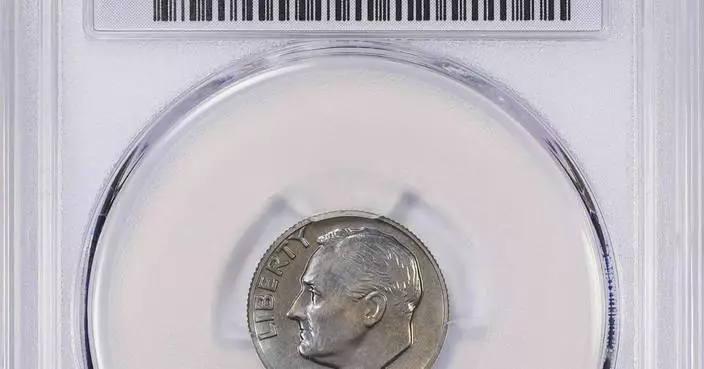LONDON (AP) — A British man who used artificial intelligence to create images of child abuse was sent to prison for 18 years on Monday.
The court sentenced Hugh Nelson, 27, after he pleaded guilty to a number of sexual offenses including making and distributing indecent images of children and distributing “indecent pseudo photographs of children.” He also admitted to encouraging the rape of a child.
Nelson took commissions from people in online chatrooms for custom explicit images of children being harmed both sexually and physically.
Police in Manchester, in northern England, said he used AI software from a U.S. company, Daz 3D, that has an “AI function” to generate images that he both sold to online buyers and gave away for free. The police force said it was a landmark case for its online child abuse investigation team.
The company said the licensing agreement for its Daz Studio 3D rendering software prohibits its use for creating images that "violate child pornography or child sexual exploitation laws, or are otherwise harmful to minors."
“We condemn the misuse of any software, including ours, for such purposes, and we are committed to continuously improving our ability to prevent it,” Daz 3D said in a statement, adding that its policy is to assist law enforcement “as needed.”
Bolton Crown Court, near Manchester, heard that Nelson, who has a master's degree in graphics, also used images of real children for some of his computer-generated artwork.
Judge Martin Walsh said it was impossible to determine whether a child was sexually abused as a result of his images but Nelson intended to encourage others to commit child rape and had “no idea” how his images would be used.
Nelson, who had no previous convictions, was arrested last year. He told police he had met like-minded people on the internet and eventually began to create images for sale.
Prosecutor Jeanette Smith said outside court that it was “extremely disturbing” that Nelson was able to “take normal photographs of children and, using AI tools and a computer program, transform them and create images of the most depraved nature to sell and share online.”
Prosecutors have said the case stemmed from an investigation into AI and child sexual exploitation while police said it presented a test of existing legislation because using computer programs the way Nelson did is so new that it isn’t specifically mentioned in current U.K. law.
The case mirrors similar efforts by U.S. law enforcement to crack down on a troubling spread of child sexual abuse imagery created through artificial intelligence technology — from manipulated photos of real children to graphic depictions of computer-generated kids. The Justice Department recently brought what’s believed to be the first federal case involving purely AI-generated imagery — meaning the children depicted are not real but virtual.

This undated photo provided by Greater Manchester Police on Monday, Oct. 28, 2024 shows Hugh Nelson, who was sentenced to prison for 18 years after he used artificial intelligence technology to create images of child abuse. (Greater Manchester Police/via AP)
NEW YORK (AP) — U.S. stocks are approaching records Monday ahead of a big week for profit reports from Big Tech stocks. Oil prices, meanwhile, are tumbling toward their worst loss in more than a year.
The S&P 500 was 0.4% higher in midday trading. The main measure of the U.S. stock market is coming off its first losing week in the last seven, but it’s still near its all-time high set earlier this month.
The Dow Jones Industrial Average was up 299 points, or 0.7%, as of 11 a.m. Eastern time, while the Nasdaq composite was 0.7% higher and flirting with its own record set in July.
Several Big Tech stocks helped lead the way, and five of the behemoths known as the “Magnificent Seven” are on this week’s schedule to report their latest profits. These high-flying stocks have been at the forefront of Wall Street for years and have grown so big that their movements can singlehandedly shift the S&P 500.
After suffering a summertime swoon on worries that their stock prices had risen too quickly when compared with their profits, Alphabet, Meta Platforms, Microsoft, Apple and Amazon are under pressure to deliver more big growth.
Another member of the Magnificent Seven, Tesla, soared to one of the best days in its history last week after reporting a better profit than analysts expected.
Monday’s gains for Big Tech helped offset drops for stocks in the oil-and-gas industry, which were hurt by the sinking price of oil. Exxon Mobil’s 0.9% drop and ConocoPhillips’ slide of 1.3% were two of the heaviest weights on the S&P 500.
A barrel of benchmark U.S. crude fell 5.2%, and Brent crude, the international standard, slid 5.3%. It was the first trading for them since Israel attacked Iranian military targets on Saturday, in retaliation for an earlier barrage of ballistic missiles. Israel’s attack was more restrained than some investors had feared it could be, and it raised hopes that a worst-case scenario may be avoided.
Beyond the violence that is taking a human toll, the worry in financial markets is that an escalating war in the Middle East could cut off the flow of crude from Iran, which is a major oil producer. Such worries had sent the price of Brent crude up to nearly $81 per barrel in early October, despite signals that plenty of oil is available for the global economy. It’s since fallen back below $72.
Financial markets are also dealing with the volatility that typically surrounds a U.S. presidential election, with Election Day fast approaching in two Tuesdays. Markets have historically been shaky heading into an election, only to calm afterward regardless of which party wins.
The trend affects both the stock and the bond markets. In the bond market, Treasury yields were ticking higher to tack more gains onto their sharp rise for the month so far.
The yield on the 10-year Treasury rose to 4.26% from 4.24% late Friday. That's well above the roughly 3.70% level where it was near the start of October.
Yields have climbed as report after report has shown the U.S. economy remains stronger than expected. That’s good news for Wall Street, because it bolsters hopes the economy can escape from the worst inflation in generations without the painful recession that many had worried was inevitable.
But it’s also forcing traders to ratchet back forecasts for how deeply the Federal Reserve will cut interest rates, now that it’s just as focused on keeping the economy humming as getting inflation lower. With bets diminishing on how much the Fed will ultimately cut rates, Treasury yields have also been given back some of their earlier declines.
That means the U.S. jobs report on the schedule for Friday could end up being the market's main event, even bigger than the Big Tech profit reports. Investors want to see more evidence of solid hiring to keep alive the perfect-landing hopes for the economy.
Such data has supplanted inflation reports, which used to be the most important for Wall Street every month but have waned as inflation seems to be heading toward the Fed's target of 2%.
Yields have also climbed as investors have seen former President Donald Trump's chances of re-election improving. Economists say a Trump win could help push inflation higher in the long term, and worsening inflation could push the Fed to hike interest rates.
Trump Media & Technology Group, the company that tends to move more with Trump's re-election odds than on its own profit prospects, jumped 16% Monday to $45.17. The parent company of Trump's Truth Social platform has been rallying since hitting a bottom of roughly $12 in late September, though it's still well below its perch above $60 reached in March.
Robinhood Markets rose 2.8% after it said it would begin allowing some of its customers to trade contracts based on whether they think either Trump or Vice President Kamala Harris will win the 2024 election.
Delta Air Lines was another winner and rose 4.2% after suing CrowdStrike, claiming the cybersecurity company had cut corners and caused a worldwide technology outage that led to thousands of canceled flight in July.
In stock markets abroad, Japan’s Nikkei 225 rose 1.8% as the value of the Japanese yen sank after Japanese Prime Minister Shigeru Ishiba’ s ruling coalition lost a majority in the 465-seat lower house in a key parliamentary election Sunday.
Stock indexes were mostly higher across much of the rest of Asia and in Europe.
AP Business Writers Yuri Kageyama and Matt Ott contributed.
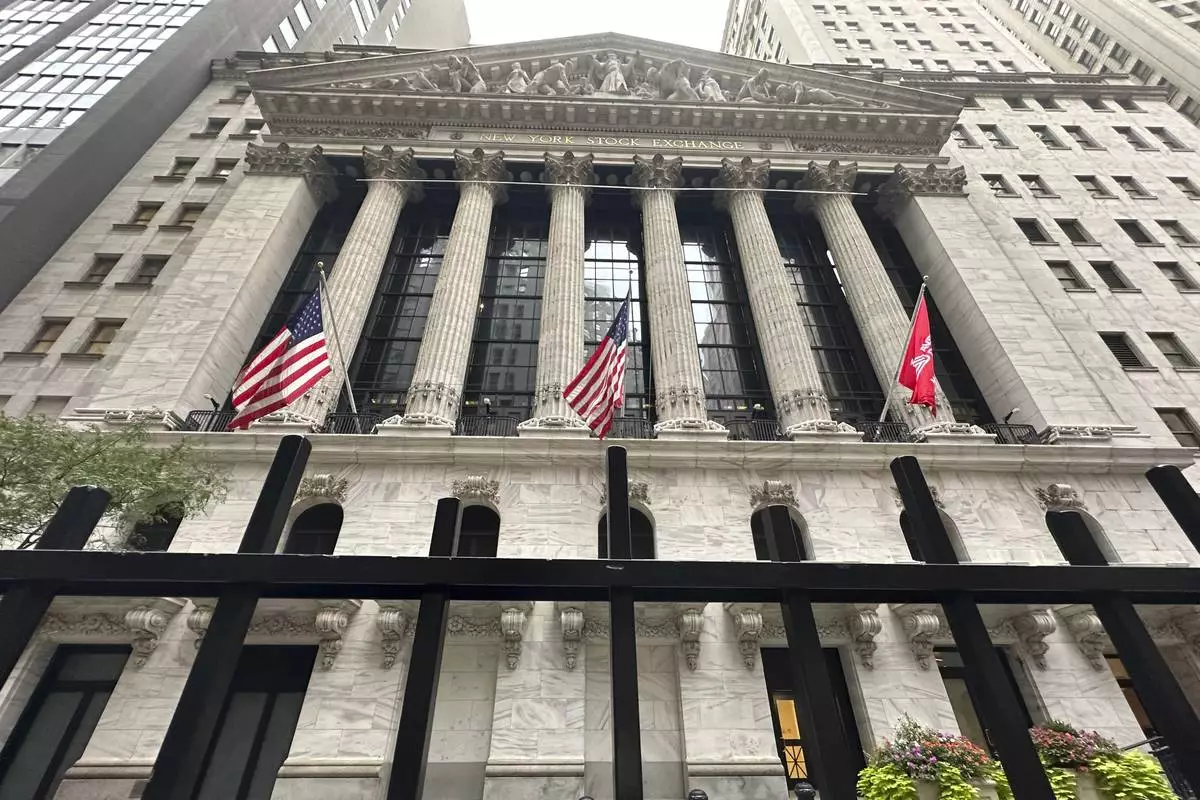
FILE - The New York Stock Exchange is shown on Sept. 18, 2024, in New York. (AP Photo/Peter Morgan)
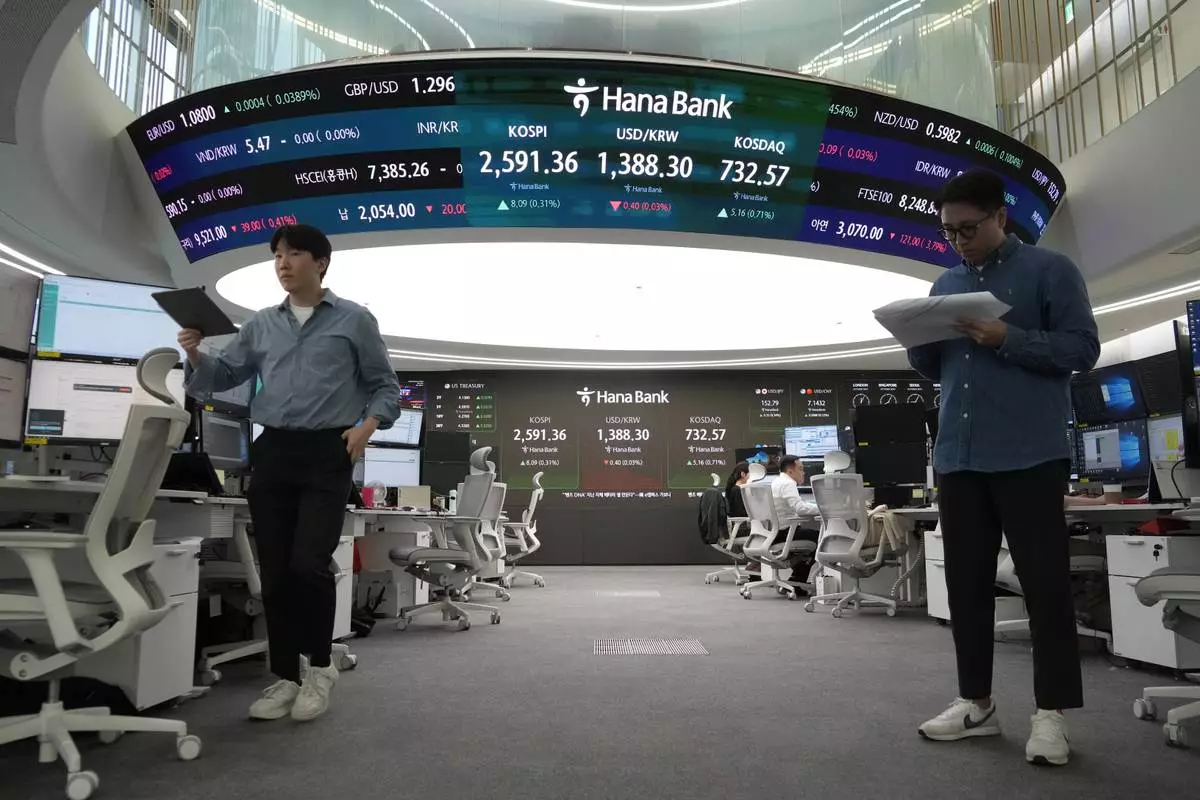
Currency traders work at the foreign exchange dealing room of the KEB Hana Bank headquarters in Seoul, South Korea, Monday, Oct. 28, 2024. (AP Photo/Ahn Young-joon)
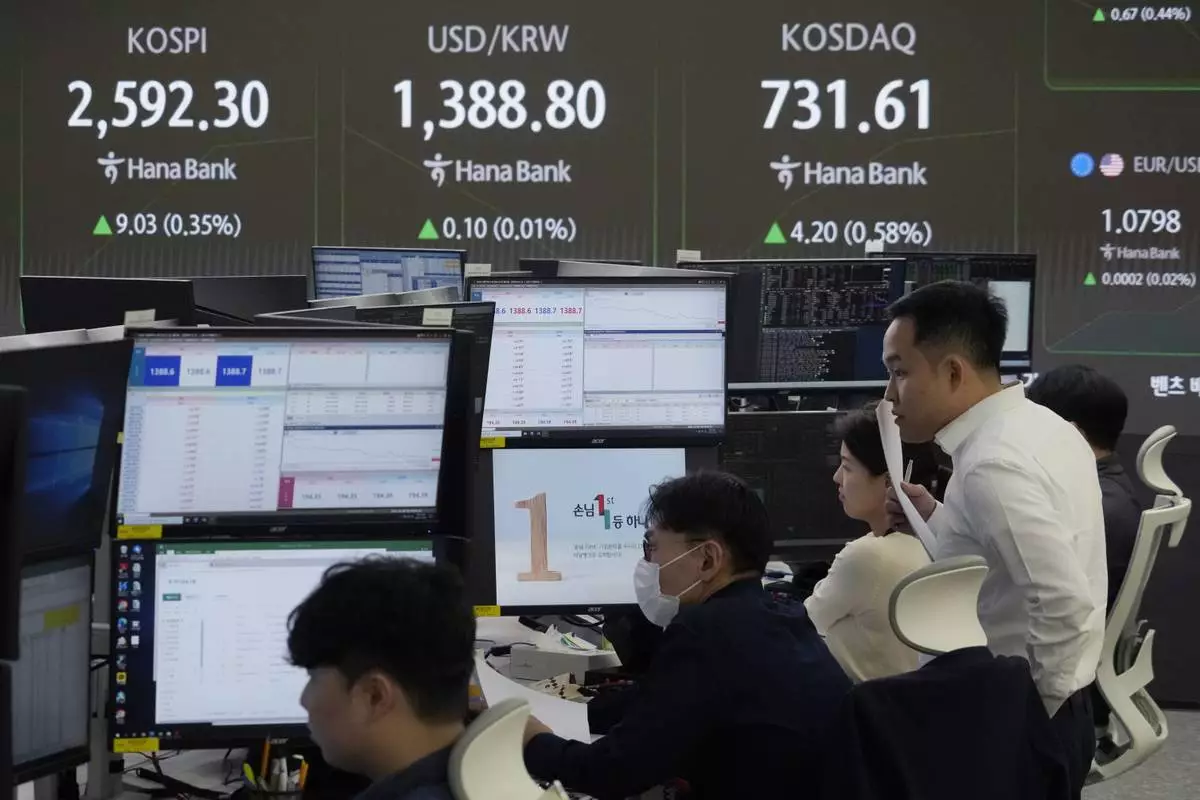
Currency traders watch monitors at the foreign exchange dealing room of the KEB Hana Bank headquarters in Seoul, South Korea, Monday, Oct. 28, 2024. (AP Photo/Ahn Young-joon)
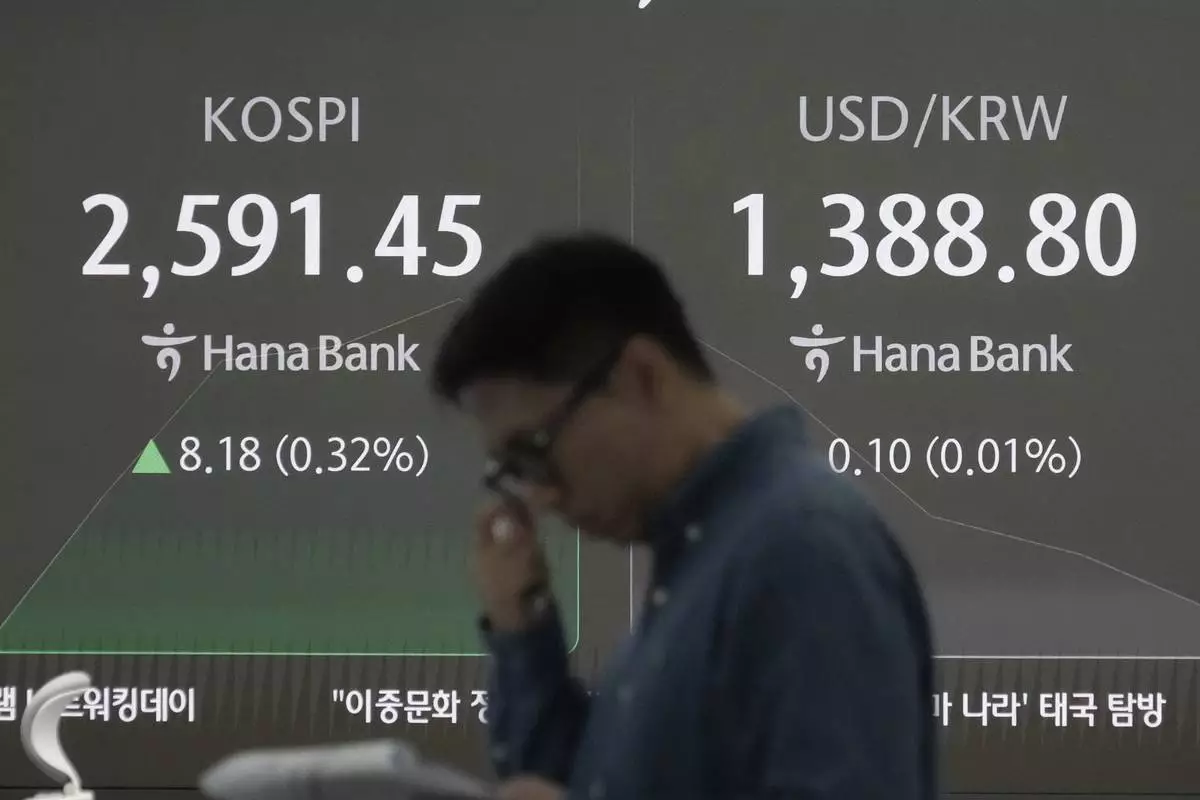
A currency trader works near a screen showing the Korea Composite Stock Price Index (KOSPI), left, and the foreign exchange rate between U.S. dollar and South Korean won at the foreign exchange dealing room of the KEB Hana Bank headquarters in Seoul, South Korea, Monday, Oct. 28, 2024. (AP Photo/Ahn Young-joon)














